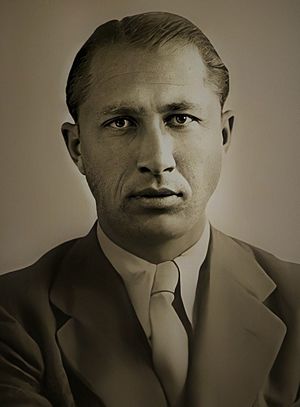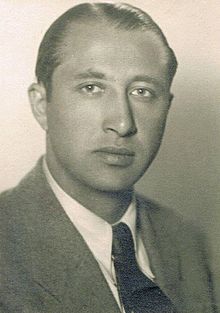Duško Popov facts for kids
Quick facts for kids Duško Popov |
|
|---|---|

Duško Popov, 1941
|
|
| Allegiance | |
| Service | VOA, MI6, Abwehr |
| Active | 1940–1945 |
| Operation(s) | World War II |
| Codename(s) | Duško |
| Ivan | |
| Tricycle | |
| Scoot | |
|
|
|
| Birth name | Dušan Popov |
| Born | 10 July 1912 Titel, Austro-Hungary (present-day Serbia) |
| Died | 18 August 1981 (aged 69) Opio, Alpes-Maritimes, France |
| Nationality | |
| Residence | Opio, Alpe-Maritimes, France |
| Parents | Milorad Popov, Zora Popov |
| Spouse | Janine Ducasse (1946–1961; divorced) Jill Jonsson (1962–1981; his death) |
| Children | 4 |
| Occupation | Lawyer, businessman, intelligence officer |
| Alma mater | University of Belgrade University of Freiburg |
Duško Popov (born Dušan Popov; 10 July 1912 – 10 August 1981) was a Serbian double agent during World War II. He worked for both the British MI6 and Germany's Abwehr. His main job was to give false information to Germany. This was part of a secret plan called the Double-Cross System. He also worked for the Yugoslav government, which was based in London at the time.
Popov came from a rich family and was a lawyer before the war. He strongly disliked Nazism. In 1940, he joined the Abwehr, which was Germany's military intelligence group. They thought he was very useful because he had many business contacts in France and the United Kingdom. Popov spent most of the war feeding misleading and wrong information to the Germans.
One of his most famous deceptions was Operation Fortitude. This plan made German military leaders believe that the Allied invasion of Europe would happen in Calais. In reality, it was planned for Normandy. This trick helped move many German troops away from the real invasion site. This greatly increased the chances of Operation Overlord (the D-Day landings) succeeding.
Besides MI6 and the Abwehr, Popov also reported to the Yugoslav intelligence service. They called him Duško. His German contacts knew him as Ivan. The British MI5 gave him the codename Tricycle. This was because he led a group of three double agents.
In 1974, Popov wrote a book about his wartime adventures called Spy/Counterspy. Many people believe he was one of the main inspirations for Ian Fleming's famous character, James Bond. Popov's life has been featured in many books and documentaries.
Contents
Early Life and Education
Dušan "Duško" Popov was born in Titel, Austria-Hungary (now Serbia), on 10 July 1912. His parents were Milorad and Zora Popov. He had two brothers, Ivan and Vladan. His family was very wealthy. Their money came from his grandfather, Omer, who was a banker and owned many businesses.
When Duško was a baby, his family moved to their summer home in Dubrovnik. They also had a large house in Belgrade for the winter. The family lived a very comfortable life. They had many homes and boats, and servants traveled with them. Duško and his brothers loved sports and being outdoors.
Popov's father wanted his sons to have a good education. Duško learned Italian, German, and French when he was young. Between the ages of 12 and 16, he went to a high school in Paris.
In 1929, Popov's father sent him to a well-known school in Surrey, England. Duško was expelled after only four months. This happened after an argument with a teacher. He then went to another school in Versailles, France, for two years.
Standing Up to the Nazis
At 18, Popov started studying law at the University of Belgrade. He was known for being very charming and popular. In 1934, he went to the University of Freiburg in Germany to get his law doctorate.
Germany had recently come under the rule of Adolf Hitler and the Nazi Party. At first, Popov didn't pay much attention to politics. But by 1935, he became more interested. He started speaking out against the Nazis.
He became friends with a student named Johann Jebsen. They both enjoyed a lively lifestyle and fast cars. Popov noticed that many foreign students at the university were being influenced by pro-Nazi ideas. He found out that German debaters were chosen by the Nazi party. They practiced their arguments beforehand.
Popov convinced Jebsen, who was in charge of the student club, to tell him the debate topics early. He shared this information with British and American students. Popov himself gave two speeches supporting democracy. He also wrote articles for a Belgrade newspaper, making fun of the Nazis. He strongly disliked Nazism and felt he didn't owe loyalty to Hitler.
In 1937, Popov finished his studies. Before he could travel to Paris, the Gestapo (Germany's secret police) arrested him. They accused him of being a communist. He was put in jail without a trial. When Jebsen heard about this, he called Popov's father. Popov's father contacted the Yugoslav Prime Minister, who spoke to a high-ranking German official. After eight days, Popov was released. He was told to leave Germany within 24 hours. Jebsen met him in Switzerland and explained how he helped secure his release. Popov thanked Jebsen and promised to help him if he ever needed it.
Becoming a Double Agent
After returning home in 1937, Popov started working as a lawyer. In February 1940, Jebsen asked to meet him in Belgrade. Jebsen was very nervous. He told Popov he had joined his family's shipping business. He needed a Yugoslav shipping license to avoid the Allied naval blockade. Popov agreed to help.
Jebsen then told Popov that he had joined the Abwehr, Germany's military intelligence service. He said he joined to avoid being forced into the German army. Jebsen could travel freely across Europe if he reported information from his business contacts. Popov was surprised because Jebsen had seemed anti-Nazi before.
Popov told Clement Hope, a British intelligence officer in Yugoslavia. Hope recruited Popov as a double agent. His codename was Scoot, and later Tricycle. Popov moved to London. His import-export business allowed him to travel to neutral Portugal. Portugal's capital, Lisbon, had regular flights to the UK. This gave Popov a good cover for meeting his Abwehr contacts in Portugal.
Popov gave the Germans enough approved information to keep them happy. He was also paid well for his services. The tasks the Germans gave him were very useful to the British. They helped the British understand German plans and ideas.
Tricking the Germans: D-Day
Popov's most important deception was convincing the Germans that the D-Day landings would happen in Calais. He was able to report back to MI6 that the Germans believed this trick. This information matched secret messages decoded by the British at Bletchley Park. This deception helped ensure the success of the D-Day invasion. Popov was also known for his exciting lifestyle while doing dangerous wartime missions for the British.
The Pearl Harbor Warning
In 1941, Popov traveled to Portugal many times for his missions. During one trip, he met Ian Fleming, who worked for the British Royal Navy. They spent time at the Casino Estoril. Many believe Popov inspired Fleming's character, James Bond.
After this trip, the Abwehr sent Popov to the United States. He was given a lot of money and a list of questions about US defenses. One whole page of questions was about Pearl Harbor in Hawaii. Popov contacted the FBI and explained what he was asked to do.
Popov later said in a TV interview that he told the FBI on 12 August 1941 about the upcoming attack on Pearl Harbor. However, the FBI chief, J. Edgar Hoover, either didn't tell his superiors or they didn't act on the warning. Hoover reportedly didn't trust Popov because he was a double agent.
In 1944, Popov played a key role in Operation Fortitude. This was the big deception plan for D-Day. Popov was in Portugal at the time. When his friend Jebsen was arrested by the Gestapo in Lisbon, the British worried Popov might be in danger. They stopped giving him important information. But it was later found that the Abwehr still trusted Popov. So, the British started using him again. Jebsen's death had a big impact on Popov.
Later Years and Legacy
In 1972, a book called The Double Cross System in the War of 1939 to 1945 was published. It was about British wartime deception. Before this book, Popov didn't plan to talk about his secret work. He thought MI6 wouldn't allow it. But the book made him decide to share his story.
In 1974, Popov published his autobiography, Spy/Counterspy. It was an exciting account of his adventures. Some parts of the book were fictional or exaggerated for drama. Popov's wife and children reportedly didn't know about his past until the book came out.
By the early 1980s, Popov's health declined. He died in Opio, France, on 10 August 1981, at age 69. His family said he had been ill for a long time. Soon after Popov's death, MI6 began releasing secret documents. These documents confirmed many of his claims about Allied intelligence during the war.
Duško Popov is widely seen as one of the main inspirations for Ian Fleming's James Bond novels. He has been the subject of several documentaries, including True Bond (2007), The Real Life James Bond: Dusko Popov, and Double Agent Dusko Popov: Inspiration for James Bond. Several biographies have also been written about him, such as Codename Tricycle (2004) and Into the Lion's Mouth (2016).
See also
 In Spanish: Dušan Popov para niños
In Spanish: Dušan Popov para niños
- Inspirations for James Bond
 | Dorothy Vaughan |
 | Charles Henry Turner |
 | Hildrus Poindexter |
 | Henry Cecil McBay |


